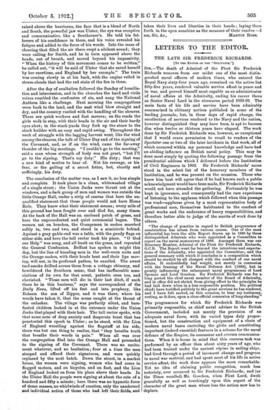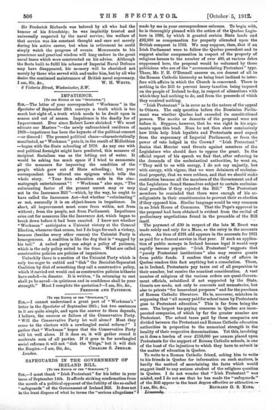LETTERS TO THE EDITOR.
THE LATE SIR FREDERICK RICHARDS.
[To Tan EDITOR 01 THY "SPECTATOR."]
Sin,—The death of Admiral of the Fleet Sir Frederick Richards removes from our midst one of the most distin- guished naval officers of modern times, who entered the Royal Navy sixty-four years ago, remained on the active list fifty-five years, rendered valuable service afloat in peace and in war, and proved himself most capable as an administrator of naval affairs at the Admiralty, ending his career there as Senior Naval Lord in the strenuous period 1893-99. The main facts of his life and service have been admirably summarized in obituary notices published in some of the leading journals ; but, in these days of rapid change, the recollection of services rendered to the Navy and the nation, however distinguished they may have been, is apt to become dim when twelve or thirteen years have elapsed. The work done by Sir Frederick Richards was, however, so exceptional that I would crave permission to recall to readers of the Spectator one or two of the later incidents in that work, all of which occurred within my personal knowledge and have had an abiding influence on British naval policy. This may be done moat simply by quoting the following passage from the presidential address which I delivered before the Institution of Civil Engineers in 1903. Sir Frederick Richards' name stood in the select list of the honorary members of the Institution, and he was present on the occasion. Those who knew him best will agree that if he had known such a public acknowledgment would have been made, Sir Frederick Richards would not have attended the gathering. Fortunately he was kept in ignorance, and consequently had the rare experience of listening to the applause which followed when this passage was read—applause given by a most representative body of
professional men, themselves habituated to the conduct of great works and the endurance of heavy responsibilities, and
therefore better able to judge of the merits of work done by others.
"The change of practice in regard to British programmes of construction has arisen from various causes. One of the most influential has been the able Report drawn up in 1888 by three distinguished Admirals who were appointed as a Committee to report on the naval manoeuvres of 1888. Amongst them was our Honorary Member, Admiral of the Fleet Sir Frederick Richards, G.C.B. The Report went far beyond the intentions and expecta- tions of the Admiralty, who appointed the Committee ; and the general summary with which it concludes is a composition which should be studied by all charged with the conduct of our naval affairs. It undoubtedly had weight, not merely in connexion with the framing of the Naval Defence Act (1889), but in greatly influencini, the subsequent naval programmes of Lord Spencer and Lord Gosohen. Sir Frederick Richards was for a long period the chief naval member of the Board of Admiralty, and in office did not shrink from giving effect to the principles he had laid down when in a less responsible position. His political chiefs have testified publicly to the great services he has rendered, and I have felt moved, on this occasion, to bear my testimony, resting, as it does, upon a close official connexion of long standing."
The programmes for which Sir Frederick Richards was primarily responsible, as chief naval adviser to the British
Government, included not merely the provision of an adequate naval force, with its varied types duly propor- tioned, but the construction and equipment of a chain of modern naval bases encircling the globe and constituting important (indeed essential) features in a scheme for the naval defence of the Empire, its commerce and oversea communica- tions. When it is borne in mind that this onerous task was performed by an officer then about sixty years of age, who had been trained under the ancient regime in sailing ships, bad lived through a period of incessant change and progress in naval war materiel, and bad spent most of his life in active service afloat, the work done appears the more remarkable. Yet no idea of claiming public recognition, much less notoriety, ever occurred to Sir Frederick Richards ; and (as the Times recalled) Mr. Goachen, when First Lord, dwelt gracefully as well as touchingly upon this aspect of the character of the great man whose loss the nation now has to deplore. Sir Frederick Richards was beloved by all who had the honour of his friendship; he was implicitly trusted and universally respected by the naval service; the welfare of that service was -his constant thought and care not merely during his active career, but when in retirement he could simply watch the progress of events. Monuments to his prescience and practical wisdom will long endure in the great naval bases which were constructed on his advice. Although the fleets built to fulfil his scheme of Imperial Naval Defence may have disappeared, his memory will be cherished not merely by those who served with and under him, but by all who desire the continued maintenance of British naval supremacy.
I am, Sir, &c., W. H. WHITE. 8 Victoria Street, Westminster, S.W.



































































 Previous page
Previous page